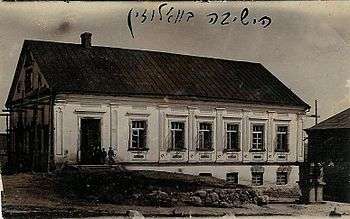Chaim of Volozhin
Chaim of Volozhin (also known as Chaim ben Yitzchok of Volozhin or Chaim Ickovits; January 21, 1749 – June 14, 1821)[1][2] was an Orthodox rabbi, Talmudist, and ethicist. Popularly known as "Reb Chaim Volozhiner" or simply as "Reb Chaim", he was born in Volozhin (aka Vałožyn or Valozhyn) when it was a part of the Polish-Lithuanian Commonwealth. He died there while it was under the control of the Russian Empire. It is part of present-day Belarus.
Student of the Vilna Gaon
Both he and his elder brother Simcha (d. 1812) studied under Rabbi Aryeh Leib Gunzberg, the author of the Shaagas Aryeh, who was then rabbi of Volozhin, and afterward under Rabbi Raphael ha-Kohen, (the author of the Toras Yekusiel), later of Hamburg.[1]
Aged 25, he was attracted by the fame of the Vilna Gaon, and he became one of the his most prominent disciples. Submitting to his new teacher's method, he began his studies anew, taking up again Torah, Mishnah, Talmud, and even Hebrew grammar. His admiration for the gaon was boundless, and after his death Chaim virtually acknowledged no superior (see Heschel Levin's "Aliyyot Eliyahu", pp. 55–56, Vilna, 1889 OCLC 77975422).[1]
Establishing the Volozhin Yeshiva

It was with the view of applying the methods of the Vilna Gaon that he founded the Volozhin yeshiva in 1803, a yeshiva that remained in operation for nearly 90 years until it was closed in 1892. The yeshiva became the "mother of all Lithuanian-style yeshivas". He began with ten pupils, young residents of Volozhin, whom Chaim maintained at his own expense. It is related that his wife sold her jewelry to contribute to their maintenance. The fame of the institution spread, and the number of its students increased, necessitating an appeal to which the Jews of Russia generously responded. Rabbi Chaim lived to see his yeshiva housed in its own building, and to preside over a hundred disciples ("Chut ha-Meshullash," responsum No. 5,[1] published by his great-grandson OCLC 13995133).
He continued to teach the Vilna Gaon's study method of penetrating analysis of the Talmudic text, seeking to elicit the intent and meaning of the writing of the Rishonim. This approach was followed by all the great Lithuanian yeshivas, such as Slobodka yeshiva, Mir yeshiva, Ponevezh yeshiva, Kelm yeshiva, Kletsk yeshiva, and Telz yeshiva.
Works
His major work is the Nefesh Ha-Chaim ("Living Soul"). Contrary to popular belief, it does not deal solely with complex understandings of the nature of God, but also with secrets of prayer and the importance of Torah, the purpose being "to implant the fear of God, Torah, and pure worship into the hearts of the upright who are seeking the ways of God". It presents a clear and orderly kabbalistic Weltanschauung that addresses many of the same issues as the Hasidic texts of the day. In addition, he wrote Ruach Chaim OCLC 30583186, a commentary on Pirkei Avoth.[1] Both titles also play on his name, "Chaim". Thus, for example, "The Spirit of Life" can also be translated as "Chaim's Spirit" or "Chaim's Soul".
Many of his responsa on halakic subjects were lost by fire in 1815.[1]
Family
His son, Yitzchak, took over the leadership of the yeshiva upon his father's death in 1821. Yitzchak's daughter, Rivka, was married to Rabbi Eliezer Yitzchak Fried, her first cousin. (Eliezer Yitzchak's mother, Esther, was Yitzchak's sister.) Another of Yitzchak's daughters married Naftali Zvi Yehuda Berlin. Among Rabbi Chaim's descendants are the Soloveitchik family.[3]
His great-great-grandson, Shimon Peres, was the President of Israel.
References
- 1 2 3 4 5 6
 One or more of the preceding sentences incorporates text from a publication now in the public domain: Solomon Schechter and Peter Wiernik (1901–1906). "Hayyim Ben Isaac of Volozhin (Hayyim Volozhiner)". In Singer, Isidore; et al. Jewish Encyclopedia. New York: Funk & Wagnalls Company.Jewish Encyclopedia Bibliography: Fuenn, Keneset Yisrael, pp. 347-349; idem, Kiryah Ne'emanah, pp. 156-158; Lewin, Aliyyot Eliyahu (ed. Stettin), p. 70; Schechter, Studies in Judaism, p. 85, Philadelphia, 1896; Jatzkan, Rabbenu Eliyah mi-Wilna, pp. 100-106, St. Petersburg, 1901; Ha-Shahar, vi. 96; Eliezer of Botoshan, Kin'at Soferim, p. 796; Ahiasaf, 5654, p. 260, and 5699, p. 81; Reines, Ozar ha-Sifrut, iii.; Ha-Kerem, 1887, pp. 179-181; David Tebele, Bet Dawid, Preface, Warsaw, 1854; Maginne Erez, Preface, Shklov, 1803; Zedner, Cat. Hebr. Books Brit. Mus. pp. 179, 555.S
One or more of the preceding sentences incorporates text from a publication now in the public domain: Solomon Schechter and Peter Wiernik (1901–1906). "Hayyim Ben Isaac of Volozhin (Hayyim Volozhiner)". In Singer, Isidore; et al. Jewish Encyclopedia. New York: Funk & Wagnalls Company.Jewish Encyclopedia Bibliography: Fuenn, Keneset Yisrael, pp. 347-349; idem, Kiryah Ne'emanah, pp. 156-158; Lewin, Aliyyot Eliyahu (ed. Stettin), p. 70; Schechter, Studies in Judaism, p. 85, Philadelphia, 1896; Jatzkan, Rabbenu Eliyah mi-Wilna, pp. 100-106, St. Petersburg, 1901; Ha-Shahar, vi. 96; Eliezer of Botoshan, Kin'at Soferim, p. 796; Ahiasaf, 5654, p. 260, and 5699, p. 81; Reines, Ozar ha-Sifrut, iii.; Ha-Kerem, 1887, pp. 179-181; David Tebele, Bet Dawid, Preface, Warsaw, 1854; Maginne Erez, Preface, Shklov, 1803; Zedner, Cat. Hebr. Books Brit. Mus. pp. 179, 555.S - ↑ Library of Congress Authorities: Volozhiner, Ḥayyim ben Isaac, 1749-1821
- ↑ D. Eliach, Avi Ha'yeshivot, p.21 (1991)
External links
- Benjamin Brown, '“But Me No Buts”: The Theological Debate Between the Hasidim and the Mitnagdim in Light of the Discourse-Markers Theory'
- JewishGen